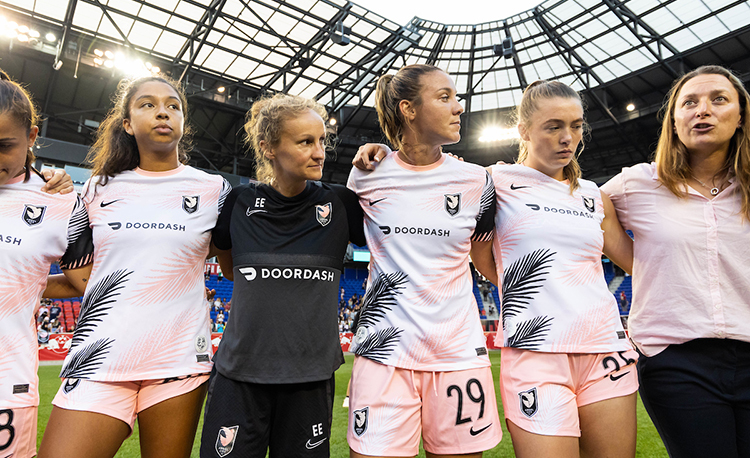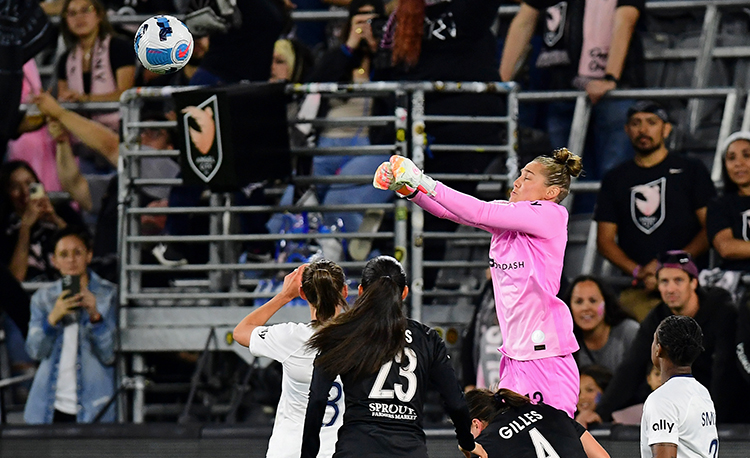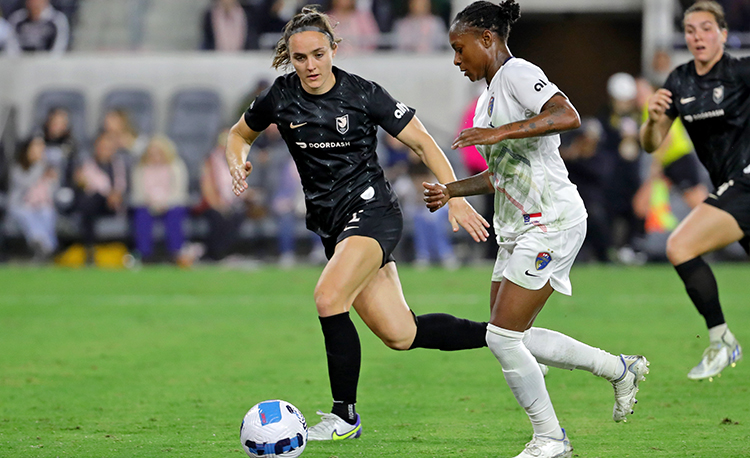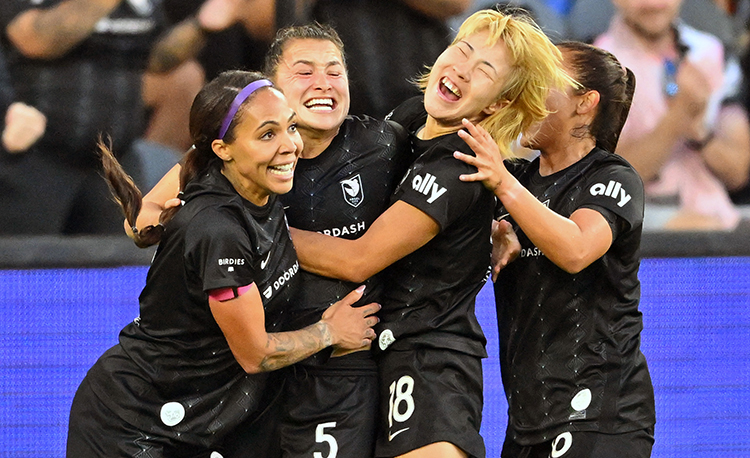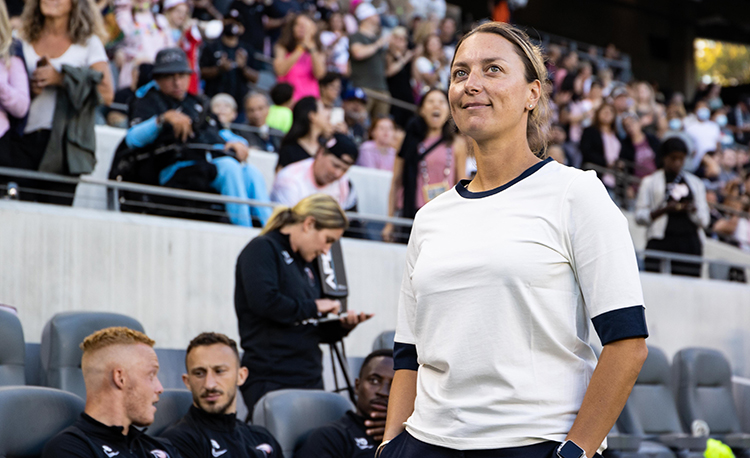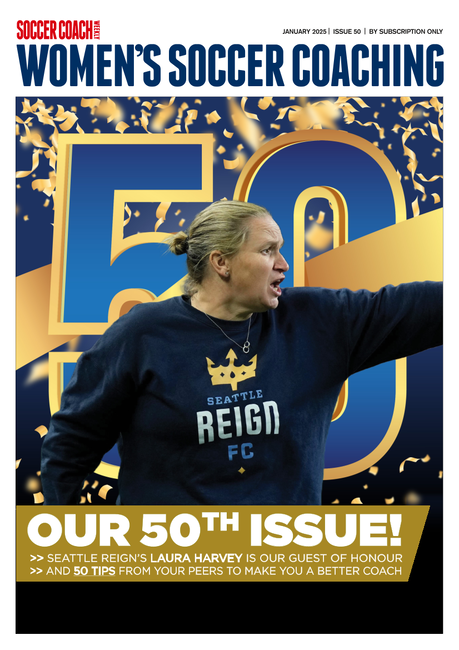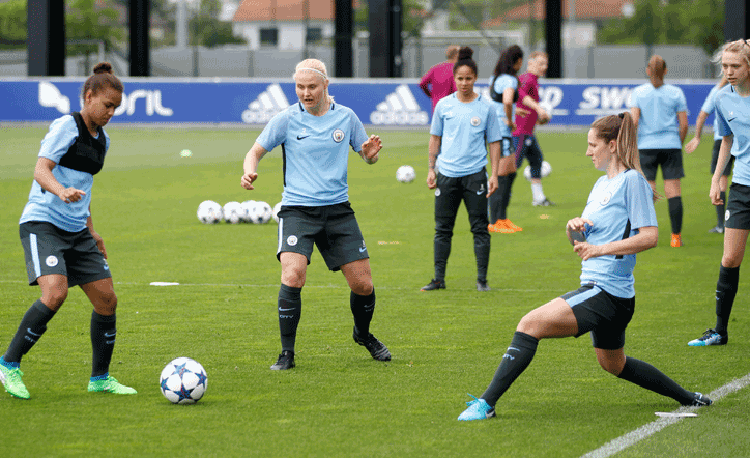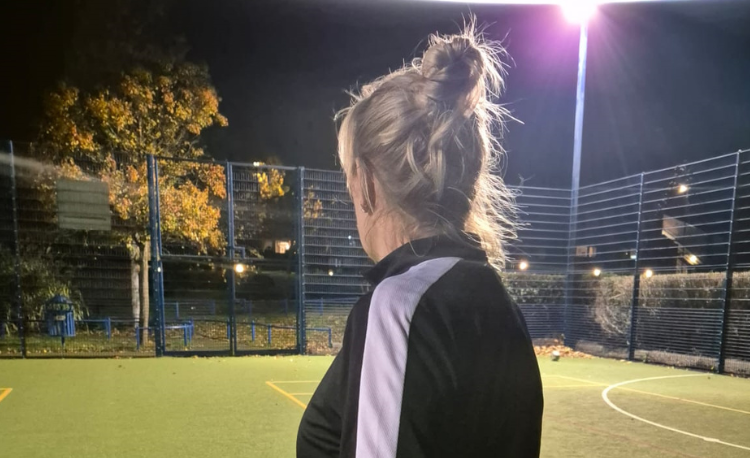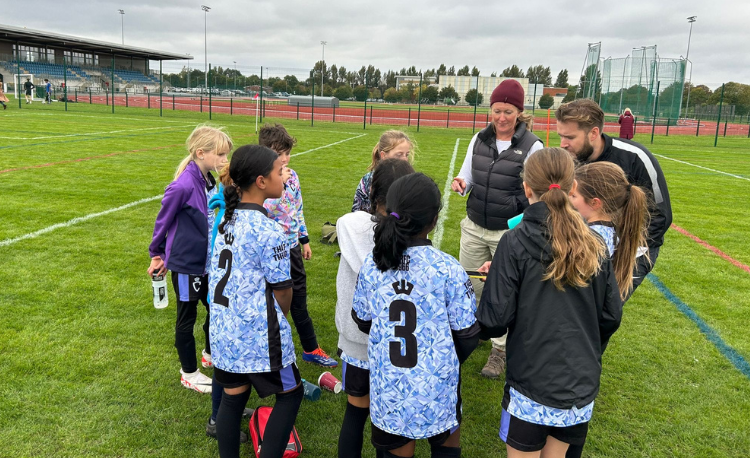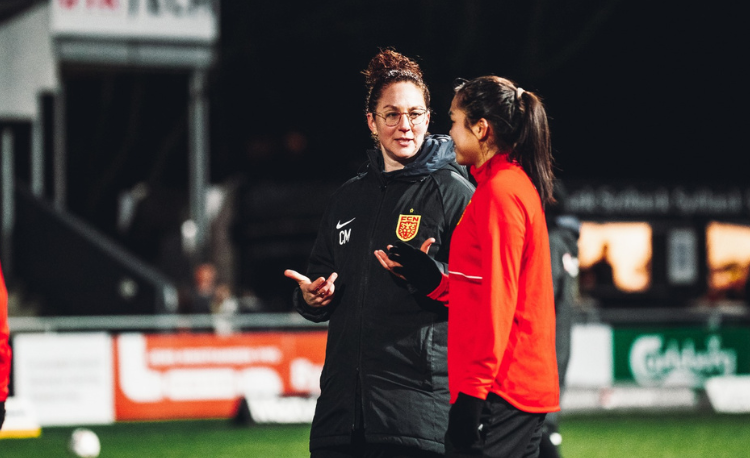You are viewing
1 of your 3 free articles
Angel City FC: league-changers with a top defensive record
While they missed out on the playoffs, Angel City FC’s first NWSL season was about more than results. Head coach Freya Coombe talks drilling the defense, noisy fans and ‘changing the league’ with Steph Fairbairn
In their first year as an NWSL expansion team, and despite finishing eighth in the standings, Angel City FC had one of the best defensive records in the division, bettered only by the top three.
It is something the new Los Angeles team prides themselves on, says head coach Freya Coombe. And it is no coincidence that they have achieved it with Coombe in charge.
Indeed, in the 2021 season, when she was at the helm of NJ/NY Gotham FC (formerly Sky Blue FC), they boasted the second-best defensive performance in the league.
It is, Coombe admits, something that runs at the heart of her coaching practice.
“Looking at how we protect the goal is the number one principle that we have,” she tells Women’s Soccer Coaching.
“A big part of the way I’ve established and created teams, not just with Angel City, is the defensive record – being very hard to beat and hard to break down.”
Those teams Coombe refers to include not just Angel City and the Goths, but youth teams and the reserve team at Reading FC in England, where she also played, and teams at Everton America in Connecticut, where she was the director of coaching, and New York Soccer Club, holding the roles of academy coach and director of scouting.
Wherever Coombe has been, defending has always been at the forefront of her mind.
“Looking at how we protect the goal is the number one principle that we have...”
And Angel City’s numbers are more impressive when you consider the injuries the team suffered before even kicking a ball.
Three players required surgery in the first week of preseason, and two of them were defenders – Paige Nielsen underwent two operations, one for a blood clot and another to have a rib taken out, while Sarah Gorden had her ACL repaired.
So how have they done it?
For Coombe, it all comes down to players knowing their roles and responsibilities at certain moments in the game.
“I think defending is a lot clearer, and more black and white, than some of the attacking plays,” she said.
“It’s about role clarity in different areas of the game, about the pressure on the ball, where we want to direct the opposition to, which areas we are willing to give up, which areas are non-negotiable.
“Whether it’s not getting played through in the central channel in the defensive third, whether it’s forcing the opponent out wide, or whether it’s higher up the field where we’re forcing them into a central space where we have numbers.
“Then it’s the basic principles that haven’t changed for years - getting pressure on the ball, getting cover, and making sure we’ve got balance.”
Talking about the roles in more depth, Coombe starts with number one – the goalkeeper.
“A lot of the defensive record is the performance of our goalkeeper [DiDi Haracic],” she says.
“If you look at the goals expected against us, and then the goals actually conceded, she has the best record in the league.
“She’s done a fantastic job of being able to keep the ball out of the net in those moments when a team should score.”
Next up are the centre backs. Coombe said: “Their main job is to defend the goal. It’s important they don’t get pulled into wide areas in the defensive third, making sure they are present within the width of the goal and protecting that space. We try to keep our centre backs home as much as possible.”
Over the course of the season, City have employed a number of formations – most of which accommodate one, sometimes two, defensive midfielders.
One of the key defensive roles they have is defending the cut back, something Coombe says the team have been looking at on the back of research from the Women’s World Cup about where most goals are scored.
Alongside her clear focus on the detail, there’s one other thing the Angel City head coach views as the key to a successful backline - a die-for-the-cause approach.
“A lot of it is about behaviours,” she says, “The willingness of the team to get behind the ball, and put their body on the line.
“I think that’s about attitude. And that’s created in the practice environment and within the team culture. That’s down to the players themselves.
“It’s having that willingness to defend, being proactive and having that mental battle with the opponent. You want them to feel like you’ve got the upper hand.
“You don’t want to ever give that attacker the moment to take charge within the game. Can we get in there from the get-go and set the tone?
“That’s where recruitment comes in, [looking for] players that are willing to literally put their body on the line to be able to prevent a goal going in.”
‘It’s changed massively’ – Freya on the role of the defender“The demands the game is placing on centre-backs now - to be able to utilise their feet in the same way the goalkeeper is expected to be able to play out, and be an extra player on the field to help start the attack - is absolutely huge.
|
Related Files
Angel City’s 27-strong roster includes US veteran Christen Press and their captain, New Zealand’s third-most capped player, Ali Riley.
One of the lesser-known names is Megan Reid, who signed following a trial as a non-roster invitee. She had been working as an emergency medical technician, believing her soccer career was done.
But the 26-year-old stepped into the void created by the preseason injuries to defenders, and has played every minute of every game for City this year.
We often look at where a team finishes in the standings as a judgement on their season.
On paper, then, Angel City’s eighth place - only missing out on their target of making the post-season playoffs on the final weekend - may not appear an unqualified success.
But, in truth, it is stories like Reid’s that tell the true tale. And Angel City is overrun with successes beyond the numbers.
Coombe said: “We wanted to fully engage with the community and be competitive.
“If you look at the history of expansion teams within the league, they’ve typically finished either bottom or in the bottom two. We wanted to change that this year.
“We set our sights on making the playoffs, but also making sure we were able to change what the league looked like, and what the standard looked like in terms of gameday experience, attendance, and in terms of some of our initiatives we were doing off the field.”
Gameday experience is something which Coombe believes sets City apart from other clubs in the league.
Banc of California Stadium, the team’s 22,000-seater arena, has, more often than not, sold out for home games. When it doesn’t sell out, it’s still pretty full. The lowest attendances have been at the 17-18,000 mark.
“For us, it’s the number of fans we have and the noise and volume,” says Coombe. “It’s the noisiest ground in the league.
“We have a fantastic stand full of supporters’ groups that are on their feet, banging drums, singing, bouncing and jumping throughout the whole game.
“You can’t hear any information that’s going on to the field. That energy is really channelled into our players - they feed off it and it makes it a really magical atmosphere.
“It’s electric. We’re very grateful that that’s our home base.”
One thing that’s special about Angel City is its vision to be ‘not just another football club’ - to make an impact on and off the soccer field, standing ‘side by side’ with the community’.
Outreach initiatives - such as delivering meals to those in need, funding female entrepreneurs, refreshing school gardens, donating soccer balls and training soccer coaches - give as much back to the area as the fans give to the team out on the pitch.
Given the club was starting from nothing, on-field and off-field targets were all the more ambitious. And for Coombe, a blank page provided both opportunities and challenges.
"We had no history to work on. We could come in and create the narrative around it..."
“We had an opportunity to completely create the culture that we wanted to see within the club, the team and the players,” she explains.
“We have no history to work on in terms of ‘we’re a losing team’, or ‘we’re a winning team’. We could come in and completely create the narrative around that.
“But, in the same vein, you come into a club and there is no process. There’s not even a flip chart and a pen or a tactics board.
“You have to go around and create everything, buy everything, create that inventory, and also establish processes.
“What time is our daily meeting? Are we having mornings, or are we having afternoons? There’s nothing to work on.
“That was great and challenging at the same time.”
It’s clear, though, that challenging isn’t something Coombe shies away from. It comes through loud and clear in her advice to other coaches.
“I think the biggest thing is just put yourself in situations where you can learn.
“Try to speak to other coaches, talk about the game as much as you can,” she says. “Also don’t wait till you’re ready, because you’re never ready.”
Going into the season, it would be easy to assume that new team Angel City weren’t ready. How they proved them wrong.
‘Make sure you foster a love of the game’ – Freya on the role grassroots coaches have in developing elite players“At grassroots level, it’s got to be a fun and challenging session for the players. What is going to inspire players to get to that [elite] level is they’ve got to be motivated and they’ve got to enjoy it.
|
Newsletter Sign Up
Newsletter Sign Up
Discover the simple way to become a more effective, more successful soccer coach
In a recent survey 89% of subscribers said Women's Soccer Coaching makes them more confident, 91% said Women's Soccer Coaching makes them a more effective coach and 93% said Women's Soccer Coaching makes them more inspired.
*includes 3 coaching manuals
Get Inspired
All the latest techniques and approaches
Women's Soccer Coaching offers proven and easy to use soccer drills, coaching sessions, practice plans, small-sided games, warm-ups, training tips and advice.
We've been at the cutting edge of soccer coaching since we launched Soccer Coach Weekly in 2007, creating resources for the grassroots youth coach, following best practice from around the world and insights from the professional game.
